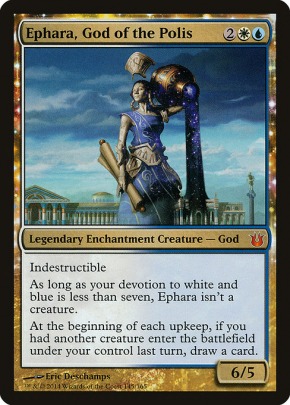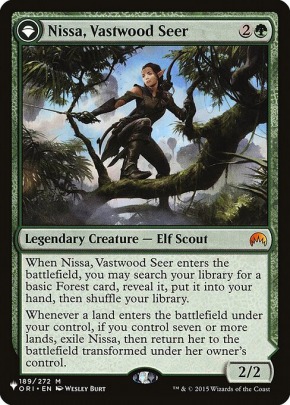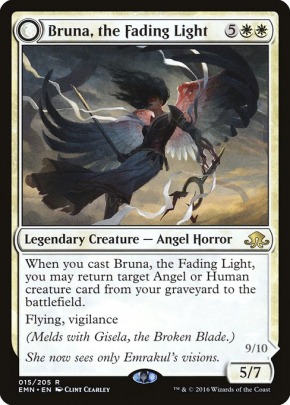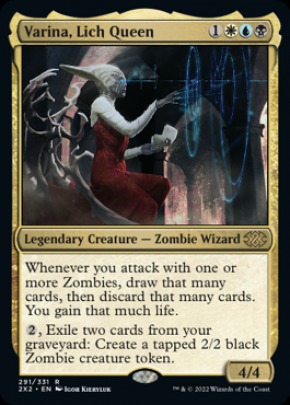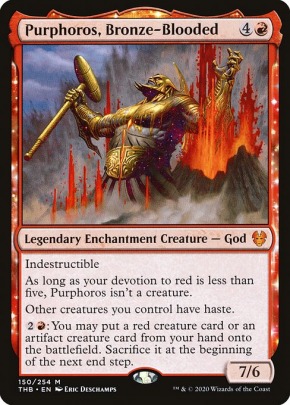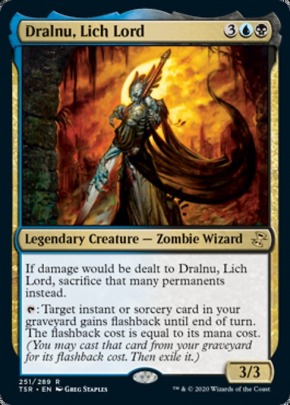How to Combat Permission
-
Cool_Doggo
- Posts: 5
- Joined: 4 years ago
- Pronoun: Unlisted
I have an issue within my playgroup, or, more accurately, I don't know how to play against common trends, and I would like advice on how to combat it.
As we have continued to play Commander, our decks have naturally gotten more and more competitive. No one consistently wins on turn three or anything, but games are shorter and there is much more interaction. Overall, this feels like a good thing. Players should play more interaction and it's probably the most affordable way to make a deck stronger; however, lately, it feels like if you don't play blue and have access to countermagic, you can't win.
So my question, how do you guys play against countermagic when your deck has none?
As we have continued to play Commander, our decks have naturally gotten more and more competitive. No one consistently wins on turn three or anything, but games are shorter and there is much more interaction. Overall, this feels like a good thing. Players should play more interaction and it's probably the most affordable way to make a deck stronger; however, lately, it feels like if you don't play blue and have access to countermagic, you can't win.
So my question, how do you guys play against countermagic when your deck has none?
Tags:
Permission style control decks have an inherent weakness in multiplayer. No one player/deck can stop everything (excepting stupid combos, and only if you let it be assembled). Rule 0 should be the first option - talk about the problem with the playgroup. Be honest, let them know that you are not enjoying the environment that essentially prevents you from ever playing in a meaningful way.
If you are the sole non-permission deck at the table, then you may need to adjust your deck to deal with that. Things like Cavern of Souls (Prowling Serpopard, Allosaurus Shepherd, etc.) can help, but you can also look for your own non-permission control elements like Angel's Trumpet, War's Toll, or Mana Cache (basically if a permission deck wants to leave land open to counter you, they have to give you free mana).
At the extreme end of 3+ permission vs 1 mid-range, you could conceivably build an entire deck that makes it difficult to counter or otherwise interact with on the stack (giving them incentive to adjust back to interaction through creatures, attacking and targeted removal). Aside from the blanket examples above, there are a significant number of creatures and spells with "can't be countered" in the rues text (mostly RG, with a few W, U, B, Gold). Surrak Dragonclaw even gives you a General in Temur colors for that type of deck.
If you are the sole non-permission deck at the table, then you may need to adjust your deck to deal with that. Things like Cavern of Souls (Prowling Serpopard, Allosaurus Shepherd, etc.) can help, but you can also look for your own non-permission control elements like Angel's Trumpet, War's Toll, or Mana Cache (basically if a permission deck wants to leave land open to counter you, they have to give you free mana).
At the extreme end of 3+ permission vs 1 mid-range, you could conceivably build an entire deck that makes it difficult to counter or otherwise interact with on the stack (giving them incentive to adjust back to interaction through creatures, attacking and targeted removal). Aside from the blanket examples above, there are a significant number of creatures and spells with "can't be countered" in the rues text (mostly RG, with a few W, U, B, Gold). Surrak Dragonclaw even gives you a General in Temur colors for that type of deck.
V/R
Treamayne
Treamayne
In a two player game, you beat counter magic by going under or going over/through.
1. Go under by playing cheap threats that can attack or put a clock on your opponent. You force them to interact and not be able to sit back/have mana left open.
2. Go over by playing a similar game of sitting back and building mana. Then when you have mana to play massive threats (think Emrakul/Ulamog), their mana saved for counters cannot do anything about the mana you've saved for threats. You can also play through counters by having so much mana and too many things that need to be countered.
Of course, in a multiplayer game, politics and threat assessment play a role that's variable from game/player to game/player. Unless you're the only one getting stuff countered and it's a playgroup dynamic thing (ie grudges or deck power level disparity), here's some ideas:
1. Sit in turn order so that you avoid going just before the counter magic holder.
2. Don't be the first or only person playing stuff that gets countered.
3. Don't play your most critical cards in instances where it'll be countered easily.
4. Build your deck to combat counter magic. E.g. how many land drops can you make in a row? Do you have a budget/card pool for specific cards like Cavern of Souls? Are you playing at sorcery speed? Do your lands do stuff besides making mana? Keep up in cards so you don't mind counters.
5. Have ways to punish players who only sit back. If you aren't attacking or actively trying to win, they can and will just sit back with counters.
1. Go under by playing cheap threats that can attack or put a clock on your opponent. You force them to interact and not be able to sit back/have mana left open.
2. Go over by playing a similar game of sitting back and building mana. Then when you have mana to play massive threats (think Emrakul/Ulamog), their mana saved for counters cannot do anything about the mana you've saved for threats. You can also play through counters by having so much mana and too many things that need to be countered.
Of course, in a multiplayer game, politics and threat assessment play a role that's variable from game/player to game/player. Unless you're the only one getting stuff countered and it's a playgroup dynamic thing (ie grudges or deck power level disparity), here's some ideas:
1. Sit in turn order so that you avoid going just before the counter magic holder.
2. Don't be the first or only person playing stuff that gets countered.
3. Don't play your most critical cards in instances where it'll be countered easily.
4. Build your deck to combat counter magic. E.g. how many land drops can you make in a row? Do you have a budget/card pool for specific cards like Cavern of Souls? Are you playing at sorcery speed? Do your lands do stuff besides making mana? Keep up in cards so you don't mind counters.
5. Have ways to punish players who only sit back. If you aren't attacking or actively trying to win, they can and will just sit back with counters.
You have a lot of options. It depends what color you want to play. If you don't want to play blue you could play Dragonlord Dromoka as a commander. Yisan, the Wanderer Bard can be countered, but green can ramp into recasting him and his ability can't be countered with a simple Counterspell. The same goes for other commanders who cheat cards into play like Kaalia of the Vast, Yennett, Cryptic Sovereign, Narset, Enlightened Master, Mayael the Anima, and Ghen, Arcanum Weaver.
If you play Edgar Markov no one is going to counter a 1/1 vampire, and if someone counters a bigger vampire you still get a 1/1 because it's a cast trigger. The same thing applies to Eldrazi Spells like Ulamog, the Ceaseless Hunger, Ulamog, the Infinite Gyre, and Kozilek, Butcher of Truth.
You could always play a Ruric Thar, the Unbowed deck that plays Prowling Serpopard and Dosan the Falling Leaf. These are some other great anti counter spell cards:
If you tell us what deck you're playing with against this group it may be easier for us to recommend anti counter spell cards for that deck.
If you play Edgar Markov no one is going to counter a 1/1 vampire, and if someone counters a bigger vampire you still get a 1/1 because it's a cast trigger. The same thing applies to Eldrazi Spells like Ulamog, the Ceaseless Hunger, Ulamog, the Infinite Gyre, and Kozilek, Butcher of Truth.
You could always play a Ruric Thar, the Unbowed deck that plays Prowling Serpopard and Dosan the Falling Leaf. These are some other great anti counter spell cards:
If you tell us what deck you're playing with against this group it may be easier for us to recommend anti counter spell cards for that deck.
Current Decks
Morophon, the infinite Kavu Eowyn, human tribal Legolas, voltron control Tymna/Ravos cleric tribal Neheb, Chicago Bulls tribal Edric pauper
Retired Decks
Edgar Markov Kaalia, angel board wipes Ghen, prison Captain Sisay Nymris, draw go Sarulf, voltron control Niv-Mizzet, combo Winota Sidisi, Zombie Tribal
Morophon, the infinite Kavu Eowyn, human tribal Legolas, voltron control Tymna/Ravos cleric tribal Neheb, Chicago Bulls tribal Edric pauper
Retired Decks
Edgar Markov Kaalia, angel board wipes Ghen, prison Captain Sisay Nymris, draw go Sarulf, voltron control Niv-Mizzet, combo Winota Sidisi, Zombie Tribal
-
ISBPathfinder Bebopin
- Posts: 2161
- Joined: 4 years ago
- Pronoun: he / him
- Location: SD, USA
There are a number of things you can do to play against control. You can mix and match some of these things.
1) Lower your curve. Counterspells are really efficient when used against more expensive mana cards. If you try to have a bunch of 6+ mana cards in your deck then yes, you will eat counterspells and feel them. If instead you chain a number of 1-4 mana spells in a turn mixed in with a higher quantity of draw it will be harder to stop you flat on your actions. Lower curves usually require a higher consistency of draw but its also much less prone to a counterspell.
2) Counter defense. There are a lot of cards like say Defense Grid, Grand Abolisher, Prowling Serpopard, Cavern of Souls, Dragonlord Dromoka to name a few that make it very hard to control your plays. The downside of these cards is often that they can under perform when you aren't against these type of decks which is why I would say that Cavern is probably more popular but also far more expensive of the bunch.
3) Play Attrition Tactics. Focusing on player's means of drawing cards and gaining resources rather can force players to just draw one card a turn. If you stop them from having extra sources of card advantage and play towards a lot of card draw and depriving of opponents draw you can really make some run out of gas. It will depend a bit on their type of deck and how they play but removing sources of card advantage can make some stutter and fall short.
4) Choice of commander. Some commanders naturally prove harder for control decks to interact with. Some commanders directly cannot be countered or have hexproof which will help against control decks. Nezahal, Primal Tide is a good example of a very challenging commander for control to interact with. Some other examples might be commanders who do things on cast, etb, or even from the command zone such as Edgar Markov or Prossh, Skyraider of Kher.
5) Type of commander. If you pick a cheap commander who isn't super commander centric it also helps quite a bit against control strategies. I mean this from the standpoint that your deck won't be over reliant on them to function which means disrupting them will net the control deck less time. An example of a commander who isn't very commander centric might be Jenara, Asura of War. What I mean by this is that you can just cast your commander on curve and they will do work without the deck being overly reliant on them to how the deck functions. Being cheap, coming in early, and being less commander centric tends to make commanders less appealing targets as well as disrupting the deck less when they do get answered.
I think these concepts can be mixed a bit but I think the best advice I can give you is to lower your curve. Become less focused on combos and more focused on good synergy between cards. The less situations you have where assembling specific cards wins you games the better off you will be against control decks. Focus more on an attrition war and less on winning in one turn and it should probably pay off fairly well. If you try attrition based concepts make sure to have plenty of draw in there. Attrition based decks can pray on control decks but also tend to fall a bit flat against combo decks. Its a bit of a circle of what is good against what. Counterspells and spot removal are great at stopping combo but they suck against someone who has good synergy, low curve, and heavy draw. On the flip side, that strategy tends to fall flat a bit against someone who jams a combo.
1) Lower your curve. Counterspells are really efficient when used against more expensive mana cards. If you try to have a bunch of 6+ mana cards in your deck then yes, you will eat counterspells and feel them. If instead you chain a number of 1-4 mana spells in a turn mixed in with a higher quantity of draw it will be harder to stop you flat on your actions. Lower curves usually require a higher consistency of draw but its also much less prone to a counterspell.
2) Counter defense. There are a lot of cards like say Defense Grid, Grand Abolisher, Prowling Serpopard, Cavern of Souls, Dragonlord Dromoka to name a few that make it very hard to control your plays. The downside of these cards is often that they can under perform when you aren't against these type of decks which is why I would say that Cavern is probably more popular but also far more expensive of the bunch.
3) Play Attrition Tactics. Focusing on player's means of drawing cards and gaining resources rather can force players to just draw one card a turn. If you stop them from having extra sources of card advantage and play towards a lot of card draw and depriving of opponents draw you can really make some run out of gas. It will depend a bit on their type of deck and how they play but removing sources of card advantage can make some stutter and fall short.
4) Choice of commander. Some commanders naturally prove harder for control decks to interact with. Some commanders directly cannot be countered or have hexproof which will help against control decks. Nezahal, Primal Tide is a good example of a very challenging commander for control to interact with. Some other examples might be commanders who do things on cast, etb, or even from the command zone such as Edgar Markov or Prossh, Skyraider of Kher.
5) Type of commander. If you pick a cheap commander who isn't super commander centric it also helps quite a bit against control strategies. I mean this from the standpoint that your deck won't be over reliant on them to function which means disrupting them will net the control deck less time. An example of a commander who isn't very commander centric might be Jenara, Asura of War. What I mean by this is that you can just cast your commander on curve and they will do work without the deck being overly reliant on them to how the deck functions. Being cheap, coming in early, and being less commander centric tends to make commanders less appealing targets as well as disrupting the deck less when they do get answered.
I think these concepts can be mixed a bit but I think the best advice I can give you is to lower your curve. Become less focused on combos and more focused on good synergy between cards. The less situations you have where assembling specific cards wins you games the better off you will be against control decks. Focus more on an attrition war and less on winning in one turn and it should probably pay off fairly well. If you try attrition based concepts make sure to have plenty of draw in there. Attrition based decks can pray on control decks but also tend to fall a bit flat against combo decks. Its a bit of a circle of what is good against what. Counterspells and spot removal are great at stopping combo but they suck against someone who has good synergy, low curve, and heavy draw. On the flip side, that strategy tends to fall flat a bit against someone who jams a combo.
Last edited by ISBPathfinder 3 years ago, edited 1 time in total.
[EDH] Vadrok List (Suicide Chads) | Evelyn List (Vamp Mill) | Sanwell List | Danitha List | Indominus List | Ratadrabik List
Others have already covered a few points I would raise - lower your curve, play value cards instead of finishers, etc.
One additional point I would suggest is to play more at instant speed. It's a lot easier to resolve spells if you can wait for the player with countermagic to tap out. You can also force them to have multiple points of interaction if you cast something at the end of the previous player's turn, untap, and then cast something else on your own turn. Alternatively, have cards like Tasigur, the Golden Fang or The Scorpion God that can function as a mana sink if you don't want to cast a spell.
One additional point I would suggest is to play more at instant speed. It's a lot easier to resolve spells if you can wait for the player with countermagic to tap out. You can also force them to have multiple points of interaction if you cast something at the end of the previous player's turn, untap, and then cast something else on your own turn. Alternatively, have cards like Tasigur, the Golden Fang or The Scorpion God that can function as a mana sink if you don't want to cast a spell.
- PrimevalCommander
- Posts: 891
- Joined: 4 years ago
- Pronoun: he / him
Commanders that are naturally resistant to control.
Prossh, Skyraider of Kher
Meren of Clan Nel Toth
Karador, Ghost Chieftain
Maelstrom Wanderer
Titania, Protector of Argoth
Golos, Tireless Pilgrim
Commanders that have some added value or naturally advance your position during cast or ETB which can mitigate some counter or removal. Meren would be a good choice because if you can keep her in play all the reanimation is an ability and cannot be countered.
Otherwise boost your card draw so that loosing one card to counters is not as backbreaking. Increasing synergy can help, but not always. Having several smaller threats work together can make removal less impactful. But opponents will eventually learn which pieces do the most work.
Overall I find drawing a lot of cards really helps slow down the control player because they cannot counter everything that 3 other players are doing. Unless your at a table with 3 control decks. That just sounds miserable.
Prossh, Skyraider of Kher
Meren of Clan Nel Toth
Karador, Ghost Chieftain
Maelstrom Wanderer
Titania, Protector of Argoth
Golos, Tireless Pilgrim
Commanders that have some added value or naturally advance your position during cast or ETB which can mitigate some counter or removal. Meren would be a good choice because if you can keep her in play all the reanimation is an ability and cannot be countered.
Otherwise boost your card draw so that loosing one card to counters is not as backbreaking. Increasing synergy can help, but not always. Having several smaller threats work together can make removal less impactful. But opponents will eventually learn which pieces do the most work.
Overall I find drawing a lot of cards really helps slow down the control player because they cannot counter everything that 3 other players are doing. Unless your at a table with 3 control decks. That just sounds miserable.
Decklists
God-Eternal Oketra
Titania, Protector of Argoth
Karador, Ghost Chieftan
Kalamax, the Stormsire
Rocco WILD PAIR
Sefris of the Hidden Ways *Budget*(Page 4)
Zurzoth, Chaos RiderKalamax, the Stormsire
Rocco WILD PAIR
Sefris of the Hidden Ways *Budget*(Page 4)
God-Eternal Oketra
Titania, Protector of Argoth
One thing I can add here is I like playing things that hate on sweepers. control decks really rely on sweepers to clean up for the most part. So cards like Teferi's Protection and Heroic Intervention and Faith's Reward and what not can be used to keep them from getting ahead. Sometimes they have countermagic to defend their sweepers but even that is a pretty awkward trade.
- toctheyounger
- Posts: 3991
- Joined: 4 years ago
- Pronoun: he / him
- Location: Auckland, New Zealand
So there's a couple of ways you can work around this, but it probably helps to know what you're running so that we can help you optimise. Nonetheless, there's a few sort of broader strategies you can use that will help:
1) Use tools that require extremely specific permission to deal with. This probably looks like Field of the Dead instead of Army of the Damned as a fairly reasonable example. Lands are much harder to remove than creatures and they can't be countered. Reanimating permanents is a similar story - they can be Stifled or Rest in Peace, but at that point your pod is getting into pretty niche control that there's only so many variations of and that gives you a much higher chance of achieving success in getting your threats into play.
2) Threat overload. Ultimately permission based decks in multiplayer cannot counter everything. They will run out of gas and be left behind. Strategically you can call that bluff by either allowing your opponents to bait the most powerful removal before you play out your key pieces, or push up the synergy in your build to a degree that it becomes hard to know what key pieces need to be denied. The latter is really dependent on who you're commanding, but its very possible and works quite well. A lot of superfriends decks use this approach, as walkers are great at distracting people from your life total, even if you can't hit their ultimate right away. Nonetheless, it's not just for superfriends; if you have a reasonable density of threats you force a certain degree of decision paralysis, especially if you're allowing your opponents to take the lead in terms of playing out an expansive boardstate (which you should, anyway - people naturally want to take out the player perceived to be in the lead). This gets even worse if you have any degree of recursion in your deck; at that point the control players are getting worse than 1:1 tradeoff on their counters (its arguably a worse tradeoff than that to start in a multiplayer game anyway), which may well even deter people from wasting their permission on you if they know you can push your permanents through in a different way anyway.
3) Play some control of your own. One of the best pieces in my mono white reanimator build is Thalia, Heretic Cathar. It isn't a beater, but it can carry equipment, casts early, and hinders the resources of the rest of the table. Nonbasics are massively prevalent in our format, and creatures entering tapped gives me a pretty great tempo swing in combat. You can go pretty heavy into this with stuff like War's Toll, Grand Abolisher, Grand Arbiter Augustin IV, but you really don't have to. I've often found going with a lighter touch of your own control means your control sticking around longer and going under the radar. Use what control you can on your own, but just give yourself the room you need, don't shut the table down entirely. You end up looking like the bad guy and there's no better way to get yourself archenemied.
4) Play at instant speed - Get into the habit of keeping a close eye on when your opponents are tapped out, and take your chances when you can get them. Chord of Calling is crazy good for this as is the blue version, Emergence Zone costs next to nothing, Winding Canyons costs a bit more but if its in your budget does great things. There's not a lot of native options for this in terms of direct to battlefield tutors and reanimation options, but there's not none either.
As mentioned above, there's ways around this - hopefully some of this helps. Let us know what sort of decks you're running and we can help tailor suggestions for your builds more specifically.
1) Use tools that require extremely specific permission to deal with. This probably looks like Field of the Dead instead of Army of the Damned as a fairly reasonable example. Lands are much harder to remove than creatures and they can't be countered. Reanimating permanents is a similar story - they can be Stifled or Rest in Peace, but at that point your pod is getting into pretty niche control that there's only so many variations of and that gives you a much higher chance of achieving success in getting your threats into play.
2) Threat overload. Ultimately permission based decks in multiplayer cannot counter everything. They will run out of gas and be left behind. Strategically you can call that bluff by either allowing your opponents to bait the most powerful removal before you play out your key pieces, or push up the synergy in your build to a degree that it becomes hard to know what key pieces need to be denied. The latter is really dependent on who you're commanding, but its very possible and works quite well. A lot of superfriends decks use this approach, as walkers are great at distracting people from your life total, even if you can't hit their ultimate right away. Nonetheless, it's not just for superfriends; if you have a reasonable density of threats you force a certain degree of decision paralysis, especially if you're allowing your opponents to take the lead in terms of playing out an expansive boardstate (which you should, anyway - people naturally want to take out the player perceived to be in the lead). This gets even worse if you have any degree of recursion in your deck; at that point the control players are getting worse than 1:1 tradeoff on their counters (its arguably a worse tradeoff than that to start in a multiplayer game anyway), which may well even deter people from wasting their permission on you if they know you can push your permanents through in a different way anyway.
3) Play some control of your own. One of the best pieces in my mono white reanimator build is Thalia, Heretic Cathar. It isn't a beater, but it can carry equipment, casts early, and hinders the resources of the rest of the table. Nonbasics are massively prevalent in our format, and creatures entering tapped gives me a pretty great tempo swing in combat. You can go pretty heavy into this with stuff like War's Toll, Grand Abolisher, Grand Arbiter Augustin IV, but you really don't have to. I've often found going with a lighter touch of your own control means your control sticking around longer and going under the radar. Use what control you can on your own, but just give yourself the room you need, don't shut the table down entirely. You end up looking like the bad guy and there's no better way to get yourself archenemied.
4) Play at instant speed - Get into the habit of keeping a close eye on when your opponents are tapped out, and take your chances when you can get them. Chord of Calling is crazy good for this as is the blue version, Emergence Zone costs next to nothing, Winding Canyons costs a bit more but if its in your budget does great things. There's not a lot of native options for this in terms of direct to battlefield tutors and reanimation options, but there's not none either.
As mentioned above, there's ways around this - hopefully some of this helps. Let us know what sort of decks you're running and we can help tailor suggestions for your builds more specifically.
Wow! This has to be one of the best Commander communities around.
Play self-recurring cards like those with Flashback, Dredge, etc.
"Accidentally" flash's couple of mass land destruction effects while shuffling. They're likely to hold back some counters in anticipation of a 'Geddon, allowing other threats to resolve. And they'll get a taste of the misery your experiencing from their permission tactics. On second thought, don't do that. It would be toxic. Maybe just mention MLD as talking point.
Play self-recurring cards like those with Flashback, Dredge, etc.
"Accidentally" flash's couple of mass land destruction effects while shuffling. They're likely to hold back some counters in anticipation of a 'Geddon, allowing other threats to resolve. And they'll get a taste of the misery your experiencing from their permission tactics. On second thought, don't do that. It would be toxic. Maybe just mention MLD as talking point.
“Comboing in Commander is like dunking on a seven foot hoop.” – Dana Roach
“Making a deck that other people want to play against – that’s Commander.” – Gavin Duggan
"I want my brain to win games, not my cards." – Sheldon Menery
“Making a deck that other people want to play against – that’s Commander.” – Gavin Duggan
"I want my brain to win games, not my cards." – Sheldon Menery
Lots of great suggestions here, but I thought I would add one of my personal favorite ways to keep people honest during your turn - Conqueror's Flail.
- hyalopterouslemur
- Posts: 3218
- Joined: 4 years ago
- Pronoun: he / him
Also, have a failure mode. If a key card gets exiled, that's it.
If you're running a lot of creatures and you're in green, I recommend Genesis. Cheap recursion. You can also run things like Dosan the Falling Leaf.
If you're running a lot of creatures and you're in green, I recommend Genesis. Cheap recursion. You can also run things like Dosan the Falling Leaf.
Thanks to Feyd_Ruin for the avatar!
I like to play aggressively costed threats like Abyssal Persecutor. Often, players running permission will have to let one of them through, and they'll have to spend resources to deal with them, or they'll eventually lose to it.
I want to second the Armageddon suggestion earlier. If your playgroup is getting to this stage, where control is this oppressive, some of the other sacred cows have to die to give the other colors a chance.
If your group says that infinite counters are fine but Armageddon is not, you guys have a problem of your own making to solve.
If your group says that infinite counters are fine but Armageddon is not, you guys have a problem of your own making to solve.
Currently building: Bruna, the Fading Light (card advantage tribal / reanimator)
Main decks;
Neheb, Big Red Champion Yeva's Mono Green Control, Ayara's Aristocrats Greven, Predator Captain the One Punch Man, Derevri, Empirical Tactician Aggro, Tymna & Kraum's Saboteurs, Kondo & Tymna's Hatebears Tuvasa's Silver Bullets, Brudiclad does Brudiclad thingsSidisi, Brood Tyrant (lantern control)
Main decks;
Neheb, Big Red Champion Yeva's Mono Green Control, Ayara's Aristocrats Greven, Predator Captain the One Punch Man, Derevri, Empirical Tactician Aggro, Tymna & Kraum's Saboteurs, Kondo & Tymna's Hatebears Tuvasa's Silver Bullets, Brudiclad does Brudiclad thingsSidisi, Brood Tyrant (lantern control)

